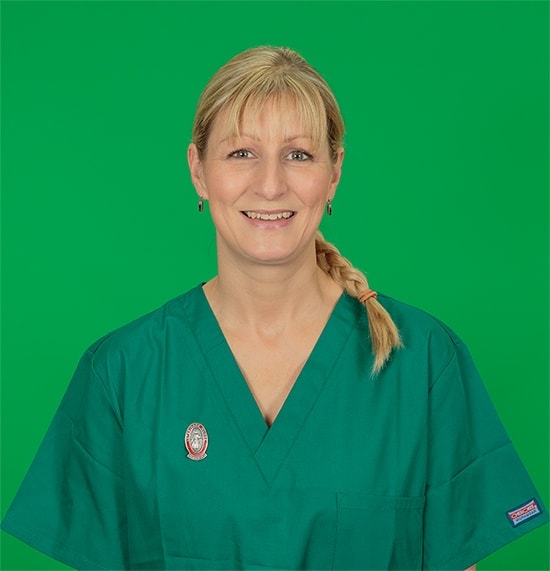May is Veterinary Nursing Awareness Month, a whole month dedicated to raising awareness of the veterinary nursing profession and the vital role they play in animal care and treatment.
Cat is one of our Registered Veterinary Nurses (RVN) here at Chapel House and she kindly took time out to tell us about life as a vet nurse.
 1. How long have you been a Vet Nurse and what route did you follow to qualify?
1. How long have you been a Vet Nurse and what route did you follow to qualify?
23years! I began by doing voluntary work experience on my days off at Charlesworth Vets. This gave me experience enough to gain a full-time position at a mixed small animal and equine practice in Hull as a Student VN. I then moved back to Chesterfield and got a student VN job at Croft Vets, who enrolled me on my VN course. This was a block release course in Berkshire which I attended for 2 years, whilst also working full time. I qualified in 1999.
2. What attracted you to a career as a Veterinary Nurse?
I enjoyed caring for all the animals I had as a child. On my parents farm I was lucky, as I could have ponies, chickens, guinea pigs, rabbits, dogs and cats. I often found many stray feral cats with kittens, who were sometimes ill from cat flu etc, so I used to rescue them and try to make them better. This was really rewarding (less so when I used to rescue feisty feral kittens that were trapped, as I would get pooed on and scratched, but I was happy I had saved them!)
3. What does your job as a Veterinary Nurse RVN entail?
I have many varied roles such as taking X rays, monitoring anaesthetics and their recoveries, caring for and monitoring in patients progress, laboratory work, dispensing medication, instrument sterilisation, placing iv catheters, taking blood and other lab samples, putting patients on iv fluids and other schedule 3 procedures (Veterinary supervised). I also triage and treat emergencies along with the vet and perform nurse consultations such as physio/rehab cases, weight management, diabetic checks, flea/worm checks, nail clips, anal gland expression, post op checks, blood sampling, blood pressure checks, suture removal, rabbit teeth burrs, dressings, general husbandry, home care advice and many others.
4. What is the most rewarding thing about being a Vet Nurse?
Being able to help a patient through its illness - working out its needs, seeing improvements and being able to convey this to the owner (who understandably are very worried), thus hopefully putting their minds at rest that their pet is in good hands. Then afterwards, seeing the same pet, with their owners all better! Great.
5. What kind of attributes do you need to be a good Vet Nurse?
I think you need to be practical, caring, able to think quickly, (whilst multi-tasking), have a sense of humour (especially when you get urinated on!) and a good team work ethic.
6. What advice would you give someone thinking about a career as a Vet Nurse?
Get experience and work hard to get good grades.
7. What are the best things about working at Chapel House Vets practice?
They’re constantly trying to improve, and it is great to be able to work with nice colleagues
8. What would be your career highlight so far?
Being able travel and locum too; Australia was great!
9. Have you completed any additional training to support you in your role?
Lots of Rabbit CPD, Physiotherapy and Rehab Merit Award
10. What's the next step in your career pathway?
No plans to change at the moment!
Thank you Cat for sharing your story.
To find out more about the role of RVNs in veterinary practices, or if you are interested in finding out more about a career in veterinary nursing, visit the BVNA website at www.bvna.org.uk/a-career-in-veterinary-nursing/a-career-in-veterinary-nursing




